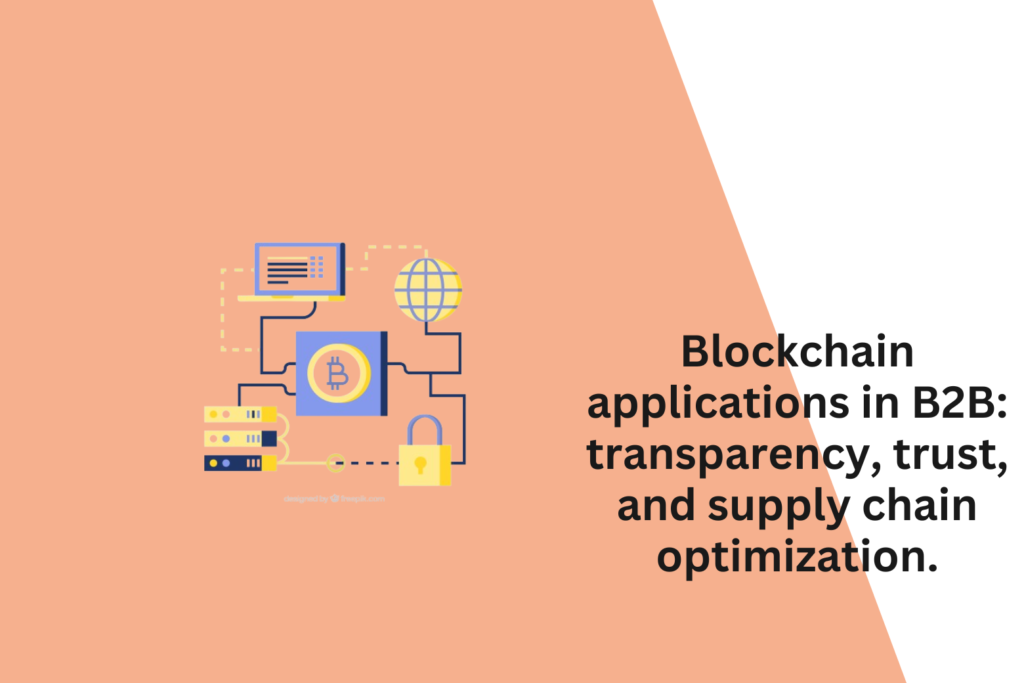
Blockchain technology offers several applications in the B2B (business-to-business) sector, providing solutions for enhanced transparency, trust, and optimization within supply chain processes. Here are key ways in which blockchain is utilized in B2B for these purposes:
1. Enhanced Transparency:
Immutable Record Keeping:
- Blockchain provides a decentralized and tamper-resistant ledger, ensuring that once data is recorded, it cannot be altered. This feature enhances transparency by creating a single version of truth that is accessible to all relevant parties.
Smart Contracts:
- Smart contracts are self-executing contracts with terms directly written into code. They automate and enforce contractual agreements, ensuring transparency in the execution of business processes, payments, and deliveries.
Real-Time Tracking:
- Using blockchain, businesses can track the movement of goods and assets in real-time. This transparency is especially valuable in supply chains, allowing stakeholders to monitor the status and location of products throughout the entire journey.
Permissioned Access:
- Blockchain networks can be designed with permissioned access, meaning that only authorized participants have access to specific data. This controlled transparency ensures privacy while still providing visibility to relevant stakeholders.
2. Establishing Trust:
Decentralization and Consensus Mechanisms:
- Blockchain’s decentralized nature eliminates the need for a central authority to validate transactions. Consensus mechanisms ensure that all participants in the network agree on the validity of transactions, fostering trust among parties.
Immutable Audit Trail:
- The immutability of blockchain records creates an audit trail that can be traced back to the origin of each transaction. This feature enhances trust by providing a verifiable history of activities and transactions.
Verified Identity and Authentication:
- Blockchain can be used to establish and verify digital identities securely. This is particularly relevant in B2B transactions where parties may not have prior relationships but need to trust the authenticity of each other’s credentials.
Anti-Fraud Measures:
- Blockchain’s secure and transparent nature reduces the risk of fraud. With tamper-resistant records and smart contract enforcement, fraudulent activities become more challenging to execute and easier to detect.
3. Supply Chain Optimization:
Inventory Management:
- Blockchain facilitates real-time visibility into inventory levels across the supply chain. This information helps businesses optimize their inventory management, reducing excess stock and ensuring timely replenishments.
Provenance Tracking:
- Tracking the provenance of products is crucial in industries like food and pharmaceuticals. Blockchain enables the recording of every stage of a product’s journey, ensuring authenticity and helping trace the origin of any issues.
Reducing Counterfeits:
- By using blockchain to trace the origin and movement of products, businesses can significantly reduce the risk of counterfeits. Customers and stakeholders can verify the authenticity of products by accessing the blockchain records.
Efficient Payments and Settlements:
- Blockchain facilitates faster and more transparent payments between parties. Smart contracts can automate payment processes based on predefined conditions, reducing delays and the need for intermediaries.
Streamlining Cross-Border Transactions:
- In international B2B transactions, blockchain can streamline and expedite cross-border payments, reducing the complexities associated with currency conversions, multiple intermediaries, and varying banking systems.
Collaborative Efficiency:
- Blockchain promotes collaboration and information sharing among supply chain participants. With a shared, secure ledger, stakeholders can collaboratively optimize processes, leading to more efficient and cost-effective supply chains.
In summary, blockchain technology in B2B is transformative, providing transparency, establishing trust, and optimizing supply chain processes. As businesses increasingly recognize the value of blockchain, its applications are likely to expand further, driving innovation and efficiency across various industries.



